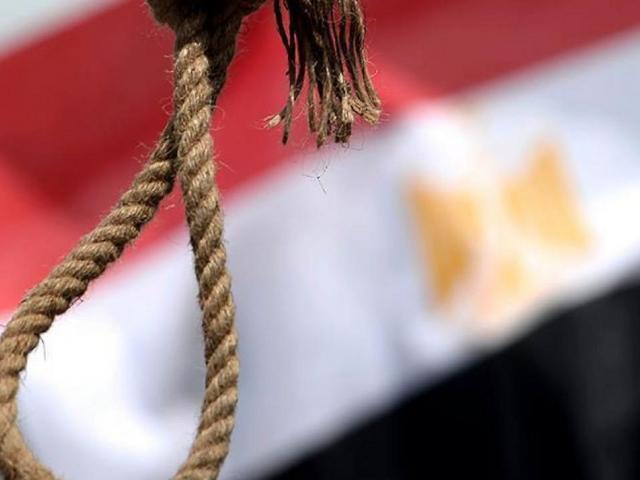
Egypt: Moratorium on executions is imperative as unjust death sentence upheld in Rabaa Dispersal Case
Press Release
The undersigned human rights organizations condemn the Court of Cassation’s 14 June verdict upholding the death sentence against twelve leaders of the Muslim Brotherhood in Case no. 2985 of 2015, known as the Rabaa Dispersal Case. The organizations demand an immediate moratorium on capital punishment in Egypt, including a halt in the implementation of the death sentences issued in the Rabaa Dispersal Case. In light of the unjust mass trial from which the verdict stemmed, the sentences must be reviewed and revised. There must be a credible and independent investigation into the mass killing of protesters during the dispersal of the Rabaa sit-in, with the aim of holding the perpetrators of egregious violations accountable.
During the bloody August 2013 dispersal of the sit-in at Rabaa al-Adawiya Square in Nasr City, security forces used live ammunition aimed at protesters, which led to more than 1,000 deaths. The prosecution has retaliated against the over 700 survivors of the massacre with charges ranging from “murder and attempted murder” to “resisting the authorities” and “vandalizing government buildings and facilities”, instead of holding the real perpetrators accountable for the mass murder of protesters.
In politically-motivated mass trials lacking any guarantee of due process, the Criminal Court followed by the Court of Cassation issued sentences of death, life imprisonment, and lengthy imprisonment against the defendants. The judiciary’s shameless disregard for justice and the rule of law clearly declares the Egyptian government’s aim to entrench a policy of impunity in defiance of the recommendations of the fact-finding committee and the report of the National Council for Human Rights on the necessity of genuine accountability and redress.
Human rights organizations have previously condemned the Cairo Criminal Court of the Terrorism Circuit’s verdict in September 2018, which sentenced 75 defendants to death and 47 defendants to life imprisonment. The trial was marred by violations and irregularities, alongside a failure to adhere to minimum fair trial guarantees. The sham verdict was upheld by the Court of Cassation with the evident aim of exacting retribution against political opponents of the current government under President Abdel Fattah al-Sisi. Over the past few years, courts throughout Egypt - including civil and military courts, and the Court of Cassation - have broadened their misuse of the judicial process to abuse political opponents and dissidents, by issuing mass death sentences, life imprisonment, and severely prolonged prison terms following appalling mass trials that have been widely condemned by the international community.
Egypt has faced widespread international backlash as it unprecedentedly expands capital punishment despite the country’s utter lack of an independent and impartial judiciary willing to uphold minimal standards of due process and justice. Numerous appeals have been made to the Egyptian government for a moratorium on the death penalty in preparation for its abolition, with an option of a policy of mitigation and harm reduction. The international outcry against the Sisi government’s unbridled enthusiasm for politically-motivated executions, alongside recommendations for an alternative policy in line with Egypt’s international human rights obligations- were heard most loudly during the Universal Periodic Review (UPR) session of the country’s human rights file before the United Nations in November 2019, and in the European Parliament’s resolutions on Egypt issued in 2018, 2019 and 2020.
Egypt ranks third globally in 2020 in its application of the death penalty, according to Amnesty International. In October 2020, 53 people were executed, including thirteen defendants in cases of a political nature. In April 2021, nine defendants were executed in Case no. 12749 of 2013 Giza Felonies, commonly referred to as the “assault on Kerdasa Police Station case,” while three other defendants in the same case were executed in October 2020.
The signatory human rights organizations reaffirm their rejection of the death penalty, and call on the Egyptian government to immediately halt its implementation. The signatories further call on the Egyptian government to comply with international demands and recommendations to enact a nationwide moratorium on this inhumane form of punishment, and to stop carrying out executions under the pretext of counterterrorism, or in retaliation against political opponents. Egypt’s record-breaking surge in violations of its citizens’ right to life discredits the government’s claim to be implementing a national strategy for human rights.
Signatory Organizations:
Cairo institute for Human rights studies
Association for Freedom of Thought and Expression
Arabic Network for Human Rights Information
Belady Center Rights and Freedoms
Committee for Justice
El Nadeem Centre for Torture Victims
Egyptian Initiative for Personal Rights
Egyptian Front for Human Rights
The Freedom Initiative



